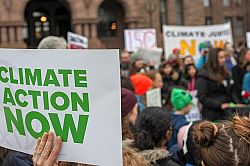

With COP26 currently in progress, the Environment Agency has warned that adaptation and becoming resilient to the effects of climate change is just as important as mitigation.
In a report to Government, the Agency has warned of more extreme weather leading to increased flooding and drought, sea level rises of up to 78cm by the 2080s, and public water supplies needing more than 3.4 billion extra litres of water per day by 2050. It has urged governments, businesses and society to embrace and invest in adaptation, rather than living with the costs of inaction.
With COP26 beginning on 31 October, it has welcomed the UK Government’s focus on adaptation as well as mitigation, and the fact that climate adaptation is one of the Summit’s four key goals, but urged that more action is needed at a global level to protect the billions of lives and livelihoods that are at risk.
Third adaptation report
The message comes in the Environment Agency’s third adaptation report, submitted to the Government under the Climate Change Act 2008.
Even with a 2°C temperature rise compared to pre-industrial levels, key projections within the report include:
The report also sets out five climate "reality checks" to make the case for urgent action on adaptation:
1. The Environment Agency alone "cannot protect everyone from increasing flood and coastal risks". Agency staff have long warned of the long-term dangers of an accelerating rise in sea level and of shifts in rainfall patterns.
2. Climate change "makes it harder to ensure clean and plentiful water". This comes as demand for water rises as the population grows, especially in eastern and south-east England.
3. Environmental rules are "not yet ready for a changing climate". The regulations on water use and pollution weren't drawn up with such rapid changes in mind.
4. "Ecosystems cannot adapt as fast as the climate is changing". This is a factor in the losses in biodiversity, particularly among freshwater species.
5. There'll be "more and worst environmental incidents". Emergencies in flooding, water shortages and pollution will strike more often and with greater severity.
Environment Agency comment
Emma Howard Boyd, Chair of the Environment Agency, said:
"The climate crisis is global, but its impacts are in your village, your shop, your home. Adaptation action needs to be integral to government, businesses and communities too and people will soon question why it isn’t – especially when it is much cheaper to invest early in climate resilience than to live with the costs of inaction.
"While mitigation might save the planet, it is adaptation, preparing for climate shocks, that will save millions of lives. Choosing one over the other on the basis of a simple either/or calculation is like telling a bird it only needs one wing to fly. With that in mind, it is deeply worrying that adaptation is in danger of being grievously undercooked at COP26. Not by the UK Government, but by the world at large.
"Significant climate impacts are inevitable. We can successfully tackle the climate emergency if we do the right things, but we are running out of time to implement effective adaptation measures. Our thinking must change faster than the climate.
"Some 200 people died in this summer’s flooding in Germany. That will happen in this country sooner or later, however high we build our flood defences, unless we also make the places where we live, work and travel resilient to the effects of the more violent weather the climate emergency is bringing. It is adapt or die. With the right approach we can be safer and more prosperous. So let’s prepare, act and survive."
For more information, see: